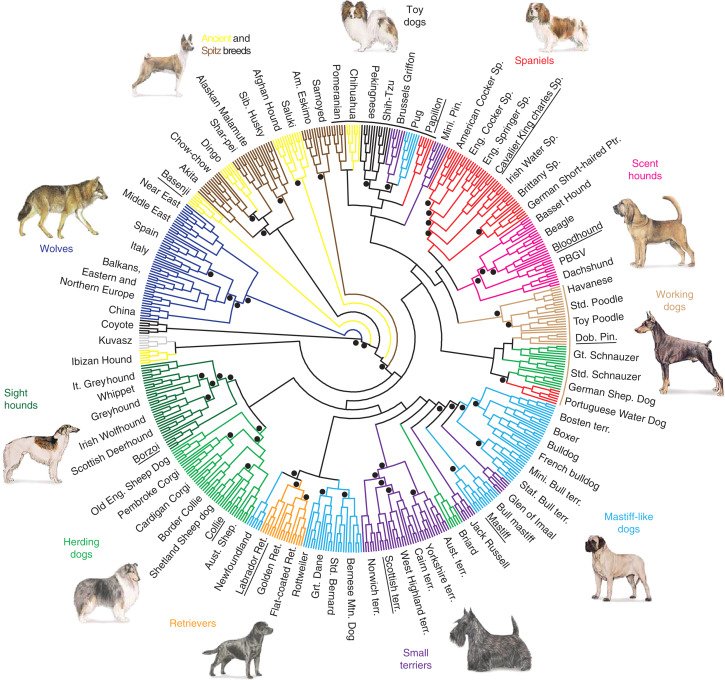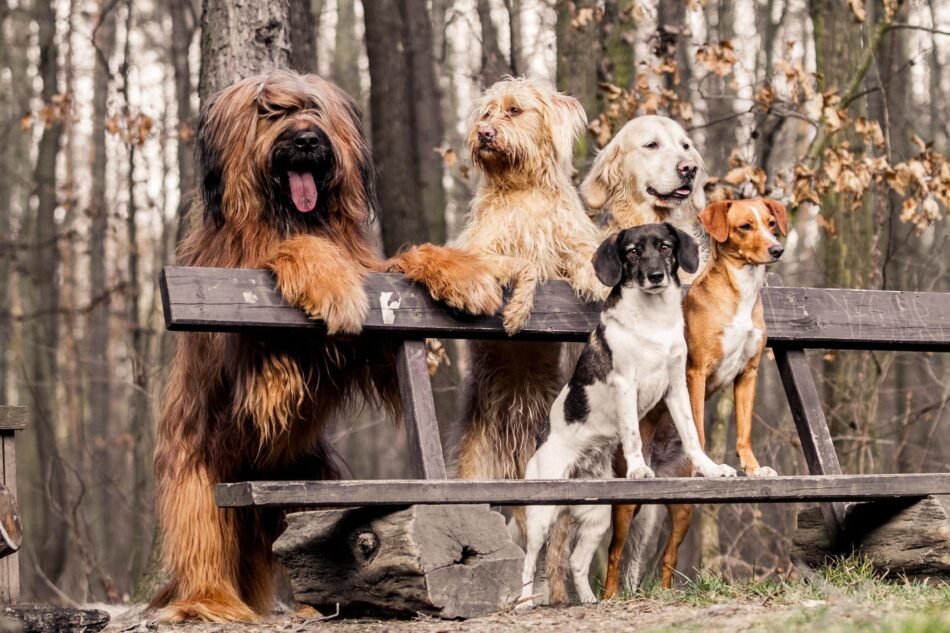Feeding our furry friends a balanced and nutritious diet is essential for their overall health and well-being. As responsible pet owners, we often find ourselves questioning whether we can provide our medium-sized dogs with large breed dog food. After all, large breed formulas are specifically formulated to meet the unique needs of bigger dogs. In this article, we will explore the considerations of feeding large breed food to medium-sized dogs and provide guidance on making the best choice for your canine companion.
Medium-sized dogs, such as Border Collies, Bulldogs, or Cocker Spaniels, have their own dietary requirements, which differ from those of both small and large breeds. While large breed dog food is designed to cater to the needs of larger dogs, it is not necessarily harmful to feed it to a medium-sized dog. However, it’s important to take certain factors into account before making a decision.

| Affenpinscher | Afghan Hound | Airedale terrier |
| Alaskan Malamute | American Cocker Spaniel | American Staffordshire Bull Terrier |
| Anatolian Shepherd Dog | Australian Cattle Dog | Australian Kelpie |
| Australian Shepherd Dog | Australian Silky Terrier | Australian Terrier |
| Basenji | Basset Fauve de Bretagne | Basset Hound |
| Beagle | Bearded Collie | Bedlington Terrier |
| Belgian Shepherd Dog Groenendael | Belgian Shepherd Dog Laekenois | Belgian Shepherd Dog Malinois |
| Belgian Shepherd Dog Tervueren | Bernese Mountain Dog | Bichon Frise |
| Bloodhound | Border Collie | Border Terrier |
| Borzoi | Boston Terrier | Bouvier des Flandres |
| Boxer | Bracco Italiano | Briard |
| Brittany | Bulldog | Bullmastiff |
| Bull Terrier | Bull Terrier Miniature | Cairn Terrier |
| Cavalier King Charles Spaniel | Cesky Terrier | Chesapeake Bay Retriever |
| Chihuahua (Smooth Coat) | Chinese Crested | Chow Chow (Smooth) |
| Clumber Spaniel | Collie (Rough) | Collie (Smooth) |
| Curly-Coated Retriever | Dachshund (Miniature Long Haired) | Dachshund (Miniature Smooth) |
| Dachshund (Miniature Wire Haired) | Dachshund (Smooth Haired) | Dachshund (Wire Haired) |
| Dalmatian | Dandie Dinmont Terrier | Deerhound |
| Dobermann | Dogue de Bordeaux | English Cocker Spaniel |
| English Setter | English Springer Spaniel | English Toy Terrier (Black and Tan) |
| Field Spaniel | Finnish Lapphund | Finnish Spitz |
| Flat-Coated Retriever | Foxhound | Fox Terrier Smooth Coat |
| Fox Terrier Wire Coat | French Bulldog | German Shepherd Dog |
| German Short-Haired Pointer | German Spitz Klein | German Wire-Haired Pointer |
| Golden Retriever | Gordon Setter | Great Dane |
| Greyhound | Harrier Hound | Hungarian Puli |
| Hungarian Vizsla | Hungarian Wire-Haired Vizsla | Ibizan Hound |
| Irish Setter | Irish Terrier | Irish Water Spaniel |
| Irish Wolfhound | Italian Greyhound | Japanese Akita |
| Japanese Chin | Japanese Spitz | Keeshond |
| Kerry Blue Terrier | King Charles Spaniel | Labrador Retriever |
| Lakeland Terrier | Leonberger | Lhasa Apso |
| Lowchen | Maltese | Manchester Terrier |
| Maremma Sheepdog | Mastiff | Newfoundland |
| Norfolk Terrier | Norwich Terrier | Nova Scotia Duck Tolling Retriever |
| Old English Sheepdog | Papillon | Parson Jack Russell Terrier |
| Pharaoh Hound | Pinscher-Miniature | Pointer |
| Pomeranian | Poodle Miniature | Poodle Standard |
| Poodle Toy | Portuguese Water Dog | Pug |
| Pyrenean Mountain Dog | Rhodesian Ridgeback | Rottweiler |
| Saluki | Samoyed | Schipperke |
| Schnauzer Giant | Schnauzer Miniature | Schnauzer Standard |
| Scottish Terrier | Shar Pei | Shetland Sheepdog |
| Shih Tzu | Siberian Husky | Skye Terrier |
| Sloughi | Soft Coated Wheaten Terrier | Staffordshire Bull Terrier |
| St Bernard | Sussex Spaniel | Swedish Vallhund |
| Tenterfield Terrier | Tibetan Mastiff | Tibetan Spaniel |
| Tibetan Terrier | Weimaraner | Welsh Corgi (Cardigan) |
| Welsh Corgi (Pembroke) | Welsh Springer Spaniel | Welsh Terrier |
| West Highland White Terrier | Whippet | Yorkshire Terrier |
One crucial aspect to consider is the nutrient profile of large breed dog food. These formulas are specifically balanced to support the growth and development of larger breeds, which have unique needs, particularly when it comes to joint health. Large breed formulas often contain controlled levels of calcium and phosphorus to promote proper bone development and reduce the risk of skeletal issues. They also have an adjusted calorie content to prevent rapid growth and potential weight gain, which could put strain on the joints.
While medium-sized dogs may not require the same level of attention to these specific nutritional aspects, it’s still crucial to provide them with a balanced and appropriate diet. Many high-quality dog foods offer formulations tailored to the needs of medium-sized breeds, ensuring they receive the necessary nutrients without the potential risks associated with large breed formulas.
When considering whether to feed your medium-sized dog large breed food, it’s advisable to consult with your veterinarian. They can assess your dog’s individual needs, taking into account factors such as age, activity level, and any specific health concerns. They can provide personalized recommendations and help you choose the most suitable diet for your beloved pet.
Another important consideration is portion control. Large breed dog food is formulated with the assumption that it will be fed to larger dogs, which means the serving sizes may be too much for a medium-sized dog. Overfeeding can lead to excessive weight gain and related health issues. Ensure that you carefully measure and adjust the portion sizes according to your dog’s needs to maintain a healthy weight.
It’s worth noting that feeding large breed dog food to a medium-sized dog for a short period, such as during a temporary shortage of medium breed formulas, is unlikely to cause significant harm. However, it’s still important to transition back to an appropriate medium breed formula as soon as possible to meet your dog’s specific nutritional requirements.
In conclusion, while it is not inherently harmful to feed a medium-sized dog large breed food, it is generally recommended to opt for a diet specifically formulated for medium breeds. By doing so, you can ensure that your furry friend receives the ideal balance of nutrients to support their overall health and well-being. Consulting with your veterinarian is crucial to determine the best dietary choice for your individual dog, taking into account their unique needs and circumstances. Remember, a well-balanced diet is the key to a happy and healthy pup!



Pingback: Building Genuine Connections with Girls, Women, and Aunties